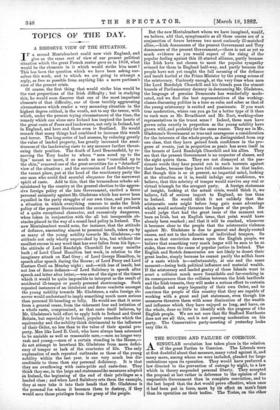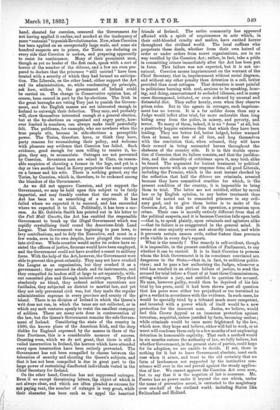THE SUCCESS AND FAILURE OF COERCION.
ASINGULAR revolution has taken place in the relation of the great Parties to Coercion. The Liberals were at first doubtful about that measure, many voted against it, and many more, among whom we were included, pleaded for large restrictions upon its operation. They would have preferred a law directed to the prevention of outrage by night, to a law which in theory suspended personal liberty. They accepted the proposal at last rather in deference to the opinion of the responsible Government than in complete conviction, and to the last hoped that the Act would prove effective, when once it had been put in force, more by its effect on men's fears than its operation on their bodies. The Tories, on the other
hand, shouted for coercion, censured the Government for not having applied it earlier, and mocked at the inadequacy of mere " restraint " to punish Revolutionaries. Now, when Coercion has been applied on an unexpectedly large scale, and some six hundred suspects are in prison, the Tories are declaring on every side that Coercion is useless, and preparing apparently to resist its continuance. Many of their prominent men, though as yet no leader of the first rank, speak with a sort of horror of the number of the Menus, and a few are even pre- pared to declare that the prisoners " still untried " have been treated with a severity of which they had formed no anticipa- tion. The Liberals, on the other hand, either support the Act and its administration, or, while condemning its principle, ask how, without it, the government of Ireland could be carried on. The change in Conservative opinion has, of course, been caused in part by the by-elections. The Irish in the great boroughs are voting Tory just to punish the Govern- ment, and the English masses are not interested enough in Ireland to outweigh their defection. They may, and probably will, show themselves interested enough at a general election, but at the by-elections an organised and angry party, how- ever limited in numbers, can always make itself powerfully felt. The publicans, for example, who are nowhere when the true people stir, become in side-elections a perceptible power. The Tories, therefore, have, or think they have, party reasons for reconsidering their policy, and welcome with pleasure any evidence that Coercion has failed. Such evidence, good enough for men willing to receive it, be- gins, they say, to accumulate. Outrages are not prevented by Coercion. Seventeen men are seized in Clare, on reason- able suspicion of shooting a farmer in the legs, and yet in a day or two another band in Kerry perpetrate the same outrage on a farmer and his wife. There is nothing gained, say the Tories, by Coercion, which is, therefore, to be reckoned among the blunders of the Government.
As we did not approve Coercion, and yet support the Government, we may be held upon this subject to be fairly impartial, and may frankly confess that the result of the Act has been to us something of a surprise. It has failed where we expected it to succeed, and has succeeded where we expected it to fail. Politically, it has been a suc- cess. As Mr. Goldwin Smith has pointed out in his letter to the Pall Mall Gazette, the Act has enabled the responsible Government to break up the illegal Government which was rapidly crystallising itself round the American-Irish Land League. That Government was beginning to pass laws, to levy contributions, and to defy the Executive, and must in a few weeks, even in its own despite, have plunged the country into civil war. Whole counties would under its orders have re- sisted the officers of justice, firearms would have been employed, and the Government could not have avoided a resort to military force. With the help of the Act, however, the Government were able to prevent this great calamity. They may not have crushed the League as an organisation, but they crushed it as a government ; they arrested its chiefs and its instruments, and they compelled its leaders still at large to act separately, with- out concerted plan and through isolated outrages. They shed absolutely no blood, they ordered neither executions nor fusillades, they subjected no district to martial law, and yet they not only prevented civil war, but they made the regular administration supreme in every province and county of the island. There is no division of Ireland in which the Queen's writ does not run, in which the taxes are not collected, or in which any mob ventures openly to resist the smallest company of soldiers. There are many acts done in contravention of the law, but the Queen's Government remains the sole Govern- ment of Ireland. Considering the state of the country in 1880, the known plans of the American Irish, and the deep dislike for England expressed by the masses in three of the four Provinces, this is a considerable measure of success. Granting even, which we do not grant, that there is still a veiled insurrection in Ireland, the horrors which have attended every open insurrection have been entirely prevented. The Government has not been compelled to choose between the toleration of anarchy and shooting the Queen's subjects, and that it has not been compelled is due in great part to the large power of restraining disaffected individuals vested in the Chief Secretary for Ireland.
On the other hand, Coercion has not suppressed outrages. Even if we except threatening letters, the obj4ct of which is not always clear, and which are often pleaded as excuses for not paying rent, the number of outrages is- very great, while their character has been such as to appal the heartiest friends of Ireland. The entire community has appeared affected with a spirit of acquiescence in acts which, in their cold-blooded cruelty and malice, have excited horror throughout the civilised world. The local ruffians who perpetrate these deeds, whether from their own hatred of order or under orders from secret organisations, are in no way terrified by the Coercion Act; rather, in fact, take a pride in committing crimes immediately after the Act has been put. in force. This failure was not expected, but it is not un- natural. Coercion means imprisonment on the warrant of the Chief Secretary, that is, imprisonment without social disgrace,. and without any other penalty than detention in a cell, better provided than most cottages. That detention is most painful to politicians burning with zeal, anxious to be speaking, hear- ing, and doing, unaccustomed to secluded idleness, and in many cases discomposed, irritated, or even sickened by unusual and distasteful diet. They suffer keenly, even when they observe prison rules. But to the agents in outrages, such imprison- ment has no terrors. It is a far milder doom than any a. Judge would inflict after trial, far more endurable than long hiding away from the police, in misery, and poverty, and terror. To many of them, indeed, it is no " doom " at all, but a positively happier existence than that which they have been leading. They are better fed, better lodged, better warmed than at home, are free of all fear, and hug themselves with the conviction that, when released, they will have their reward in being accounted heroes throughout the shebeens of the country side. It is in this double opera- tion of Coercion that its failure consists, and that the justifica- tion, and the absurdity of criticisms upon it, may both alike be found. The argument for lenient treatment to political. prisoners meets with an eager response from all good Liberals, including the Premier, which is the next instant checked by the reflection that half the Menus are criminals, arrested because they have committed cruelties for which, in 'the present condition of the country, it is impossible to bring them to trial. The latter are not entitled, either by moral law or by English opinion, to any better treatment than would be meted out to remanded prisoners in any ordi- nary gaol, and to give them better is to make of the Coercion Act, in this part of its operation, a premium upon crime. Their case is morally entirely different from that of the political suspects, and it is because Coercion falls upon both —that is, to speak plainly, upon criminals and agitators alike —that its failure is so exaggerated in the general mind. It seems at once unjustly severe and absurdly lenient, and while it prevents certain unseen evils, rather fosters than prevents evils visible in every day's reports.
What is the remedy ? The remedy is self-evident, though it is impossible, in the present condition of Parliament, to say whether it can be carried. It is to limit Coercion to persons whom the Irish Government is in its conscience convinced are dangerous to the State,—that is, in fact, to seditious politi- cians; and to pass a law authorising the Judges, whenever a trial has resulted in an obvious failure of justice, to send the accused for trial before a Court of at least three Commissioners, sitting without a jury, and entitled to question the accused.
No man, however guilty, would then be deprived of his fair trial by his peers, until it had been shown past all question that his peers were either too prejudiced or too terrorised to give a verdict in accordance with the evidence. In such cases, he would be specially tried by a tribunal much more competent, and invested with a power which of itself would be a new protection for the innocent man. Juries, we believe, would feel this Crown Appeal as an immense protection against terrorism, acquittal, unless justified by facts, becoming useless ; while criminals would be once more frightened by the law, which now, they hope and believe, either will fail to work, or at worst will condemn them only to a few months of not unpleasing detention in honourable captivity. That such a method would in six months restore the authority of law, we fully believe, but whether Government, in the present state of parties, could hope for its adoption, we are unable to decide. If not, there is nothing for it but to leave Government absolute, meet each case when it arises, and trust to the old certainty that no form of lawlessness not supported by the instinctive con- science will ever in the end prevail against the steady applica- tion of law. We cannot approve the Coercion Act even now, but to say that it is the negation of law is nonsense. Mr. Forster has no power under it beyond the one which, under the name of preventive arrest, is entrusted to the magistracy over one-half of the civilised world, including States like Switzerland and Holland.



































 Previous page
Previous page